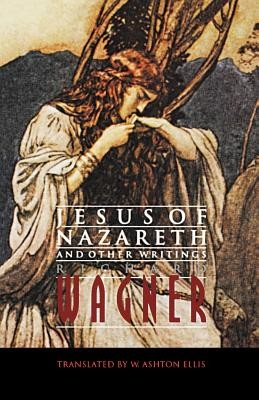
- We will send in 10–14 business days.
- Author: Richard Wagner
- Publisher: Bison
- ISBN-10: 0803297807
- ISBN-13: 9780803297807
- Format: 13.7 x 20.4 x 2.6 cm, minkšti viršeliai
- Language: English
- SAVE -10% with code: EXTRA
Reviews
Description
Near the end of his life, Richard Wagner supervised the publication of his collected writings, providing an extensive view of his thoughts about art and politics from his youth to his final period of triumph. After his death, there was still more to be told: his admirers discovered a large number of writings he had forgotten, misplaced, never published, or had chosen to omit from his collected works. This volume, the last of eight volumes now reprinted by the University of Nebraska Press, collects the most illuminating of those works. The title work, "Jesus of Nazareth," was written in 1848 or 1849; its composition coincided with the most widespread revolutionary ferment seen in Europe. It expresses Wagner's own revolutionary ideals, thoroughly justified (or so he thought) by Jesus and the early Church. At the time Wagner considered Jesus as a revolutionary leader whose struggles with authority and traditions were much like his own. The opening work is "Siegfried's Death," a poem written in 1848 that set the tone for his most famous operatic work, the tetralogy Der Ring des Nibelungen. Whole sections of the poem were later incorporated into the fourth Ring opera, Gotterdammerung, but the differences are as revealing as the carryover. The essays that Wagner published in journals but saw fit to exclude from his Gesammelte Schriften might have embarrassed the elderly sage but are key documents to Wagner's activities in his revolutionary period. For example, his ardently prorevolutionary essay, "The Revolution," would have displeased the wealthy patrons of his later years. This edition includes the full text of volume 8 of the translation of Wagner's works published in 1899 for the London Wagner Society.
EXTRA 10 % discount with code: EXTRA
The promotion ends in 22d.16:28:28
The discount code is valid when purchasing from 10 €. Discounts do not stack.
- Author: Richard Wagner
- Publisher: Bison
- ISBN-10: 0803297807
- ISBN-13: 9780803297807
- Format: 13.7 x 20.4 x 2.6 cm, minkšti viršeliai
- Language: English English
Near the end of his life, Richard Wagner supervised the publication of his collected writings, providing an extensive view of his thoughts about art and politics from his youth to his final period of triumph. After his death, there was still more to be told: his admirers discovered a large number of writings he had forgotten, misplaced, never published, or had chosen to omit from his collected works. This volume, the last of eight volumes now reprinted by the University of Nebraska Press, collects the most illuminating of those works. The title work, "Jesus of Nazareth," was written in 1848 or 1849; its composition coincided with the most widespread revolutionary ferment seen in Europe. It expresses Wagner's own revolutionary ideals, thoroughly justified (or so he thought) by Jesus and the early Church. At the time Wagner considered Jesus as a revolutionary leader whose struggles with authority and traditions were much like his own. The opening work is "Siegfried's Death," a poem written in 1848 that set the tone for his most famous operatic work, the tetralogy Der Ring des Nibelungen. Whole sections of the poem were later incorporated into the fourth Ring opera, Gotterdammerung, but the differences are as revealing as the carryover. The essays that Wagner published in journals but saw fit to exclude from his Gesammelte Schriften might have embarrassed the elderly sage but are key documents to Wagner's activities in his revolutionary period. For example, his ardently prorevolutionary essay, "The Revolution," would have displeased the wealthy patrons of his later years. This edition includes the full text of volume 8 of the translation of Wagner's works published in 1899 for the London Wagner Society.


Reviews